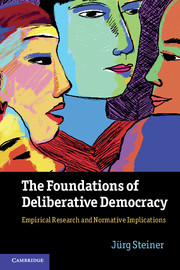Book contents
- Frontmatter
- Contents
- Figures
- Acknowledgments
- Introduction
- 1 Citizen participation in deliberation
- 2 Rationality and stories in deliberative justification
- 3 Common good and self-interest in deliberative justification
- 4 Respect in deliberation
- 5 Public openness of deliberation
- 6 Force of better argument in deliberation
- 7 Truthfulness in deliberation
- 8 Deliberation in the media and the Internet
- 9 Favorable conditions for deliberation
- 10 Favorable consequences of deliberation
- 11 The praxis of deliberation
- Appendix Newest version of Discourse Quality Index (DQI)
- Index
- References
1 - Citizen participation in deliberation
Published online by Cambridge University Press: 05 August 2012
- Frontmatter
- Contents
- Figures
- Acknowledgments
- Introduction
- 1 Citizen participation in deliberation
- 2 Rationality and stories in deliberative justification
- 3 Common good and self-interest in deliberative justification
- 4 Respect in deliberation
- 5 Public openness of deliberation
- 6 Force of better argument in deliberation
- 7 Truthfulness in deliberation
- 8 Deliberation in the media and the Internet
- 9 Favorable conditions for deliberation
- 10 Favorable consequences of deliberation
- 11 The praxis of deliberation
- Appendix Newest version of Discourse Quality Index (DQI)
- Index
- References
Summary
Normative controversies in the literature
There is consensus among deliberative theorists that ordinary citizens should have the opportunity to take part in political deliberation, but there is controversy over how many citizens should actually do so. On the one hand, there is the normative position that ideally all citizens should be involved in political deliberation. In their everyday life, they should discuss political matters in their families, with friends and neighbors, in the workplace, and in their clubs and associations. These discussions should have a deliberative character in the sense that participants should be open to the force of the better argument. As a consequence, opinion-formation at the grass-roots level would take place in a reflective way. These reflected opinions are then communicated to political leaders through a variety of channels like personal encounters, public meetings, the media, and the Internet. This participatory position is advocated by Jürgen Habermas, who argues that all those affected by a political decision should be included in deliberation (Inklusion aller Betroffenen). Since important decisions, for example about the environment or health care, affect everyone, the Habermasian position implies that everyone should participate in the deliberation of such issues. Habermas hopes that deliberation among ordinary citizens will have an influence on elections, legislation, and administrative power, since “the flow of communication between public opinion formation, institutionalized elections, and legislative decisions is meant to guarantee that influence and communicative power are transformed through legislation into administrative power.” In this way, citizens should be a strong countervailing force against the two traditional influences in politics, “money and administrative power.”
- Type
- Chapter
- Information
- The Foundations of Deliberative DemocracyEmpirical Research and Normative Implications, pp. 32 - 56Publisher: Cambridge University PressPrint publication year: 2012



